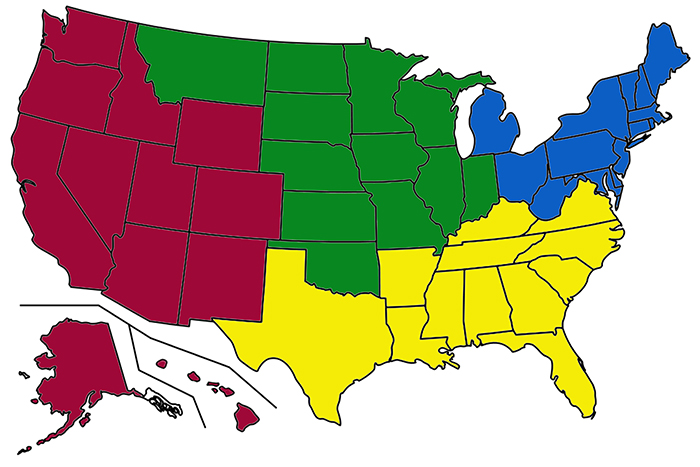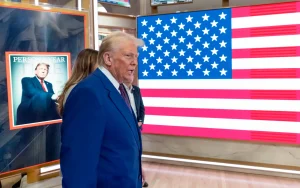This Land is Your Land
The United States divided into 4 sub-countries.
May 19, 2016
The future is in small, modernized states–not gigantic, militaristic/industrial countries. Our growing nation, 318.9 million strong, stretched across an entire continent, 3,000 some miles, could be most optimistically described as “too big to fail.”
Acknowledging the urbanization of the wealthy, the suburbanization of the poor, climate change, the need for renewable energy and worldwide economic crises, the United States can no longer be efficiently managed, protected and changed under a single federal government.
One solution is to separate the U.S. into four sovereign countries: the U.S. of the West, Mid-West, South and East–having the East and Midwest joined if there is an agreeing consensus. The regions would be more subject to the will of the people seeing as the sense of community grows within the outlined borders and sense of disenfranchisement lessens. For instance, in Louisiana, the hundreds of thousands of poor living in waterlogged slums are more likely to have increased political efficacy as the problem that they face affects their country a lot more than it would under the 50 states.
This “great divide” will take place under supervision of the federal government and it’s military. Imagine an eight year period in which a mass exodus occurs, all U.S. citizens will be able to move to whichever country they want to–until the population reaches an agreed upon cap. The plan comes from an assumption that there will be enough resources to make sure no one is left behind. Although, the amount of spending and investment leading up to the final days of the split will more than likely create an economic climate capable of sustaining such an intense change.
I also propose an “American Union,” a political union, in which representatives selected by each nation would all collaborate to establish common economic, foreign, security, and justice policies.
The breaking up of the U.S. would certainly require, at least until each country gets on its feet, a monetary union. I believe that in the long-run, a new currency would be particularly beneficial as the four countries would most likely not agree to raise interest rates which would eventually distort the economies. As oil runs out and climate change intensifies, shocks to the economy make urgent the need for better investment and more heavy reliance on savings.
In terms of political unity, the two coasts could implement their kind of policy far better than before. Drug prohibition would likely end for the most part, higher marginal tax rates for the wealthy implemented, lower defense spending with more money for education and infrastructure would lead to lower crime and public health costs. Overall, the quality of life could be on par with the Scandinavian countries.
The U.S. of the South could be pushed towards progress. They’d have a huge windfall of oil money, most likely creating low flat tax, with an increase in consumer spending would spur economic growth in the short-run. In the midst of this boost, the government would be capable of using its surplus to rebuild the hundreds of miles of neglected infrastructure and increase accessibility to healthy foods, good education and adequate pay through universal job availability. The most frightening aspect of the newly created sovereign South is: One, the South’s complete disregard of global warming and deregulation on industry and two, a militarily independent South. However, to the latter point, nuclear warfare and the internet make conventional weapons obsolete.
The most difficult nuances to work around making this idea successful come from the logistics of dismantling established political corruption, new democratic elections in each region and economic weakness and stability during the intermediary time of the split as well as dividing of the national debt–although it could be easily remedied if our entitlement and defense programs are restructured, and under four countries, it would be. The point that most people will be vehemently defending, is the sentimental value of the American culture we’ve been christened into. The U.S.’s “tradition” is one of separatism since its advent. Of course, the notion of “home” is dearer. This is something that can’t be argued against except by the idea that everything ends someday. So, why not now?











